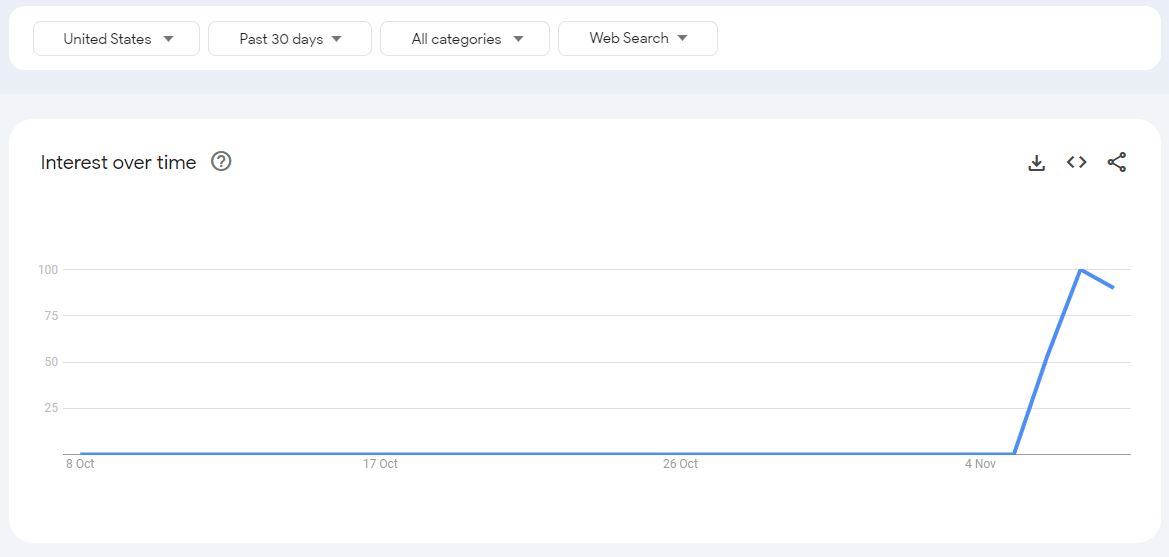U.S. women dissatisfied with the re-election of Donald Trump are taking a sudden interest in a feminist movement that started in South Korea and encourages the rejection of heterosexual marriage, sex, childbirth and dating.

The 4B movement, as it’s called, began in South Korea when women started swearing off heterosexual dating in protest of misogyny in the Asian country. While it’s hard to pin down the start of 4B, it’s believed to have begun around 2017, but gained traction in 2018 when protests erupted around the country in response to a spy cam epidemic and grew into a #MeToo-esque feminist phenomenon.
On Wednesday, Google searches for “4B” spiked by 450 per cent in the U.S., with the most interest coming from Washington D.C., Colorado, Vermont and Minnesota. More than half-a-million search inquiries in the span of 48 hours shot the term high into trending results on the search giant.
Meanwhile, hundreds of videos from U.S. content creators have popped up on TikTok, with women disappointed by Tuesday’s results vowing to participate in their own version of 4B.
What 4B stands for
The 4B movement stands for four Korean words beginning with “bi” or “no” in English: bihon means no heterosexual marriage; bichulsan, no childbirth; biyeonae, no dating; and bisekseu, no heterosexual sexual relationships.
Supporters of the movement may refuse to date, marry, have children or have sex (or any combination of these), effectively boycotting a system they feel prioritizes gender inequality.
And while some participants might want to have marriage and children, they believe the risks of having to conform to traditional gender roles outweigh the benefits of starting a family.
While the movement first started in response to revenge porn and spy cams targeting South Korean women, it’s become a rallying cry for other existential threats: access to abortion and quality health care, the gender pay gap, intimate partner violence and more.
Essentially, women are sending a message that if violence and inequality against them does not stop, they will ensure the birth rate falls.
“It’s a new lifestyle focused on building safe communities, both online and in-person. What we want is not to be labelled simply as some man’s wife or girlfriend, but to have the independence to be free from the societal expectations that often limit women’s potential to be fully acknowledged as human beings,” Haein Shim, a South Korean activist, told The Guardian, emphasizing that the movement goes beyond just boycotting men and sex, and encourages participants to find solidarity and community with each other.
Shim said being a participant in the movement has brought backlash and she and other women have faced harassment, stalking, cyberbullying and threats of violence.
“Many of us wore masks, sunglasses and hats to cover our faces, and it was common practice to dress differently before and after a protest to minimize being stalked.”

Get daily National news
How big is the 4B movement?
While 4B is seeing a big spike in interest in North America, it’s difficult to determine how widespread it’s become in South Korea given its largely anonymous nature. It also reaches into both online and offline culture.
As The Independent notes, it’s been credited in South Korea with the growing education gap between men and women — nearly three-fourths of Korean women pursue higher education today, compared with less than two-thirds of men, allowing women to entertain the possibility of a life where they are not reliant on a male spouse.
South Korea also has the lowest birth rate in the world, which continues to fall, a fact that some have attributed to 4B, although no concrete data has been presented to support that theory.
In 2022, President Yoon Suk Yeol blamed feminism for the country’s low birth rate, saying he would increase penalties for false accusations of sexual crimes, and denied the existence of “structural discrimination based on gender.”
The previous year, he also accused feminist movements of “blocking healthy relationships” between men and women in the nation.
What’s driving American interest in 4B?
It’s no secret that women’s rights are increasingly under threat in the United States, and Trump’s re-election was seen by many as a referendum on women’s rights that now has them afraid for what the next four years might hold.
With the overturning of Roe v. Wade, combined with many in Trump’s administration being opposed to abortion, there’s fear that the U.S. could soon face a federal abortion ban and other dwindling reproductive rights.
Many believe Trump has been “strategically abiguous” on his position on abortion, especially during this most recent election. During his campaign he said he would not support a federal ban and wants to leave the issue up to the states.
However, he also used this year’s campaign to repeatedly frame the overturning of Roe v. Wade as an accomplishment no other Republican could claim.
“For 54 years, they were trying to get Roe v. Wade terminated. And I did it,” he told a Fox News town hall in January. “And I’m proud to have done it.”
A far-right policy agenda known as Project 2025, a sprawling manifesto published in April 2023 by conservative think-thank The Heritage Project that claimed to speak for no presidential candidate, takes a hard line on criminalizing abortion drugs and many fear it will become the playbook Republicans use for the next four years.
Project 2025 would also deny federal healthcare providers from practicing gender-affirming care for transgender people and eliminate insurance coverage for the morning-after pill, arguing that it is an abortion drug.
While the book never explicitly says that abortion should be criminalized as a whole, the project contends that life begins at conception and its policies would make an abortion virtually inaccessible for many.
Despite Trump saying he has “no idea who is behind” Project 2025, journalist Judd Legum was first to report that 31 out of the 38 people who helped write and edit the book served in Trump’s administration or were nominated to positions in it.
Many also feel that gender inequality has become a major problem in the U.S., pointing to the pay gap — women working full-time, on average, earn 84 cents for every dollar made by a man.
This election cycle saw a whole group of Gen Z voters become newly familiar with Trump’s “grab ’em by the p—“ remarks about women from a leaked Access Hollywood video that made headlines in 2016. And, just last week, he told rally supporters he would “protect” women “whether the women like it or not.”

If the 4B movement does gain a foothold in the U.S., it has the potential to backfire, some experts warn.
“It would create a further divide between women and men, leading men to be even more disgruntled, and perhaps an even more misogynist culture,” Sarah Liu, a senior lecturer in Gender and Politics at the University of Edinburgh, told Newsweek.
“As American men are grappling with the shift in gender roles, which has been one of the reasons why they’ve voted for conservative leaders like Trump, women’s agency in partaking in the U.S.-version of the 4B movement would further confirm their beliefs that their masculinity is threatened and that they need to take back the control of women.”
“It’s also important to remember that while Trump’s major supporters are men, many women, particularly white women, also voted for Trump. So the 4B movement might further this impression that men are the major force behind Trump’s election, ignoring the role white women play.”
Katharine Moon, a political science professor at Wellesley College, told the New York Times that even if the 4B movement picks up long-term traction in the U.S., it would surely look different than in South Korea due to cultural differences.
In South Korea, she explained, marriage is considered central to existence as an adult and “until very recently, being a social adult — not coming-of-age at 18 or such but being a socially recognized adult — marriage was mandated.” Essentially, not being married as a woman in South Korea can result in one becoming a social pariah.
“It’s a temporary means (in the U.S.) to bring attention to the precarious situation of women, with Trump and his ascending to power,” she said. “So it’s not really about a total commitment to a way of life without men. Whereas in South Korea, it is a way of life.”
















Comments